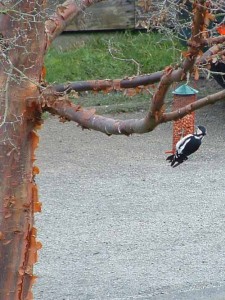An economic study on behalf of the Wildlife Trust for Birmingham and the Black Country has valued the contribution of ‘Green Infrastructure’ to the area at around £21million a year – and this is a minimum estimate.
 Pressure on the natural environment, especially in urban areas, is increasing. One reason is that ecosystem services and the benefits they provide to human welfare are ignored or undervalued and not adequately assessed in planning and policy. Most benefits provided by Green Infrastructure are still fairly uncertain and not marketable. The term “Green Infrastructure” describes the structure, position, connectivity and type of green spaces. On behalf of the Wildlife Trust, environmental economist Oliver Hölzinger has undertaken the work in an attempt to start to put a value on these services. Oliver’s presented his findinmgs to a workshop at the International Association for Landscape Ecology – UK conference “Landscape Ecology and Ecosystem Services” this week.
Pressure on the natural environment, especially in urban areas, is increasing. One reason is that ecosystem services and the benefits they provide to human welfare are ignored or undervalued and not adequately assessed in planning and policy. Most benefits provided by Green Infrastructure are still fairly uncertain and not marketable. The term “Green Infrastructure” describes the structure, position, connectivity and type of green spaces. On behalf of the Wildlife Trust, environmental economist Oliver Hölzinger has undertaken the work in an attempt to start to put a value on these services. Oliver’s presented his findinmgs to a workshop at the International Association for Landscape Ecology – UK conference “Landscape Ecology and Ecosystem Services” this week.
Within Birmingham and the Black Country, ecosystem services provided by woodland, heathland and wetland have been valued. Stating the best guess, 2,422 ha of Green Infrastructure provides an annual value of at least £20.8 million which results in £1.1 billion capitalised over 100 years. A detailed summary table can be found in the executive summary report. Considering the incomplete scientific evidence and partially insufficient baseline data, a wide range of ecosystem services are not included in this value. Therefore the findings can be interpreted as a minimum estimate of the total value.
Wildlife Trust Chief Executive, Neil Wyatt, says: “Most of us instinctively value wildlife and green spaces to our well being, but in difficult economic times it can be seen as less of a priority. This work is a key step towards quantifying the very real contribution the natural world makes to Birmingham and the Black Country”.
Generally ecosystem services can be separated into four categories. Provision services cover e.g. the supply of food, raw material or medical resources. Services such as the moderation of extreme weather events or waste-water treatment can be categorised as regulation services. Furthermore, Green Infrastructure provides habitats for species and cultural services. The latter describes the non-material benefits people obtain from contact with nature such as aesthetic appreciation or space for recreation.
Economic valuation of ecosystems can help to mitigate this undervaluation and is receiving increasing attention in politics and science. Monetarisation makes ecosystem services more tangible for decision makers and planners. Further details, including downloadable reports, can be found on the Wildlife Trust Website at: www.bbcwildlife.org.uk/valuing-green-infrastructure


